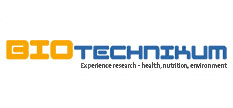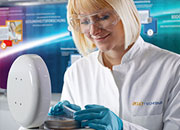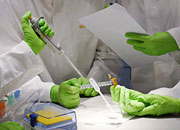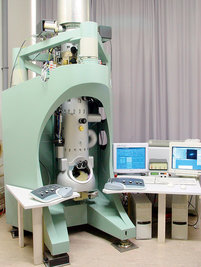Biotechnology – Technology with tradition
The origin of biotechnology is lost in the mists of time, because the use of biotechnological processes reaches back thousands of years. However, only biological knowledge of recent times and particularly the last decades has enabled the rapid development of biotechnology, as we know it today.
Since time immemorial people have known the art of wine making or vinegar extraction, and using biotechnological processes to produce milk products such as cheese, yoghurt or kefir. It is not known when one of our ancestors used yeast for the first time to make bread rise or to brew beer. What is certain however is that the Codex Hammurabi of the Babylonians from the 17th century BC explicitly mentions beer. In this way people have long been benefiting from the useful properties of microorganisms such as Saccharomyces cerevisiae (bakers yeast) or Lactobacillus bulgaricus (lactic acid bacteria) without knowing anything about these microorganisms.
This only began to change in the second half of the 19th century: Louis Pasteur was one of the first to recognise the connection between the effects of microorganisms on the one hand and the material changes perceivable to us on the other hand – discoveries for which he used biochemistry and microscopy methods amongst other things. The expression ”biotechnology“ was first used by the Hungarian engineer and economist Karl Ereky in 1919. Analogously to the stone and iron ages, he anticipated a biotechnological age. This prophecy seems to have come true today.
Today, we have opportunities to understand the ”tools“ of nature, to change them in a targeted way and adapt them to our needs. This would be impossible without the enormous amount of knowledge acquired by biological sciences in the last decades. Some important milestones: the elucidation of the structure of the hereditary molecule DNA at the beginning of the 1950s as well as deciphering the genetic code in the 1960s. The methods of genetic engineering – transferring hereditary material in a targeted way even between organisms of different species – began being developed in 1973 and in 1982 allowed human insulin to enter the market as the first genetically engineered medicine. Today we know the totality of hereditary information, the so called genome, of numerous species – from simple bacteria right up to humans. This basic knowledge about the building plan of life will contribute to the fact that biotechnology will continue to rapidly enhance its position as one of the key technologies of the 21st century.
Milestones in the history of biotechnology
From the bread of the Egyptians thousands of years before Christ, to the cultivation of bacteria by Robert Koch right up to the deciphering of the rice genome: the most important points in biotechnology in a timetable. more












